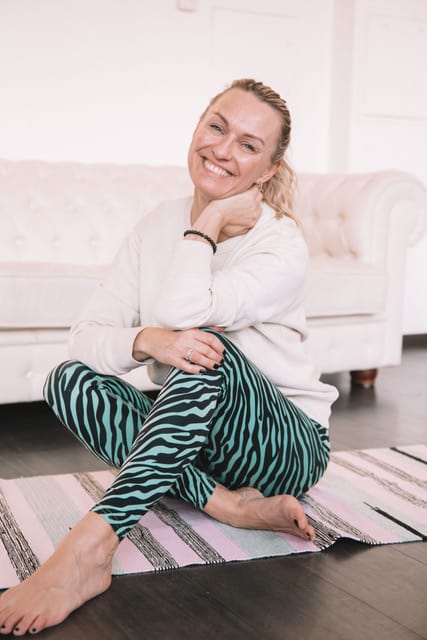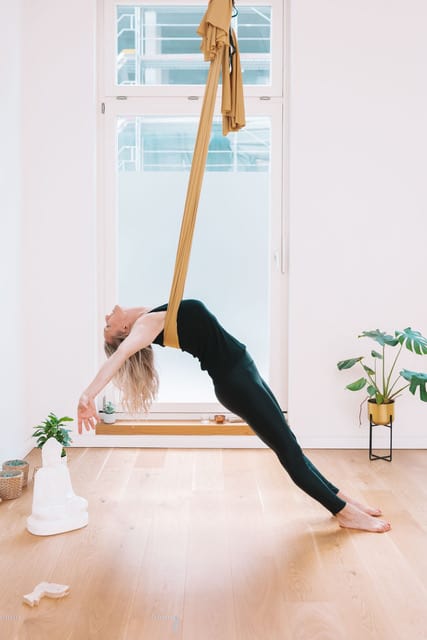
How to establish a sustainable, long-term sports routine
Three months have passed since we made our New Year’s resolutions – so have you managed to stick to them so far? If the answer is yes, congratulations! That means you’ve established a sustainable routine. We asked our partner Miriam from Every Damn Day Yoga why a routine is so important and how it benefits us. So if you’re looking to build a healthy, sustainable training regime, read these tips and establish long-term habits.
Why is it important to establish long-term exercise routines?

“No matter what goal you set for yourself – whether it’s physical health, the ability to stay balanced when stressed or eating a healthier diet – everything takes time,” explains Miriam. It often takes a while to see results when starting a new routine, which is why it’s important to establish small but sustainable goals, regularly switch things up and remain patient. When you stick to a routine, you’re doing your future self a real favor and increasing the likelihood of personal success, whether in sports, at work or in your private life. Consistent routines help you make lasting changes in your life in the direction you want to go, however one-off sessions often aren’t enough to see long-term personal success.
How do I establish a sustainable sports routine?
1. Identity-based approach
Vague long-term goals are difficult to keep. A classic example is “I’ll have the perfect figure by summer.” This isn’t really a goal, and usually ends in frustration and rarely in success. One approach to establishing a sustainable fitness routine is an identity-based approach. When planning your routine, think about why you want to establish this new habit. This isn’t about the goal or outcome (i.e.“I want to run a marathon” or “I want to eat healthy every day”) but rather about who you want to be. For example, “I am a runner” or “I am a conscious and healthy person.” “With each exercise session, you’ll then focus on that person and slowly change your self-image and, in turn, your identity,” says Miriam. “When you reach a certain threshold the habits exponentially lead to sustained success and you’ll start seeing results, such as an increase in physical fitness or a healthier diet.”

2. Set realistic goals with small steps

Miriam recommends planning as concretely as possible: “Instead of pledging to exercise frequently this month, be more specific about your goal. For example, you can plan to play badminton with Andrea on Monday night and then yoga with Tom on Friday.” Small steps are the secret to success, so be specific and set yourself short-term and realistic goals. It’s also important to focus on one routine before establishing another. Only when one routine is solidified and part of your identity should you move on to the next.
3. Find something you enjoy

It’s easiest to establish a routine when you enjoy what you’re doing. If you don’t like cardio don’t do it, because it will only lead to frustration if you want to stay fit and active long-term. They say if we want something badly enough to succeed – but that’s not necessarily true. Instead, find something you really enjoy. With Urban Sports Club membership, you can try over 50 sports, which means you’re sure to find something you love. So try out classes like spinning, dancing or bouldering with a buddy and sweat and stay motivated together.
It’s much easier to work out if your studio is near your home or office rather than the other side of the city, and if your commute is from your bed to your desk, you can get active between the two with our Live Classes. For most classes all you need is a gym mat, and even that can be replaced by a rug. It doesn’t get easier than that! If you’ve had a stressful day and are low on time, try a super short class. You can even choose when and where you get active with our On-demand offer.
4. Find incentives and reward yourself

It’s important to see your routine as something that enriches your life, rather than restricts it. And this applies to any goal – including less smartphone time, more time with your family, more frequent exercise and a healthier diet. For example, if you want to eat a more balanced diet, cook together with your family or friends. It’s more fun together, and you eat less in company than you do alone in front of a TV so it’s win-win! Reward yourself for reaching your goals. Not with sweets, but with that city break you’ve been thinking about for ages but haven’t got round to going on. This will act as a great incentive and will make resolution-keeping more fun. Miriam from Every Damn Day Yoga says that bad habits, just like good ones, are subject to a dopamine loop so incentives help us stay on track. This is about balancing work with reward, like going for a delicious meal after yoga on a Friday.
5. Keep your progress in mind

If you haven’t yet established a set routine for your resolutions and you’re struggling to stay consistent, it’s worth looking at what you’ve already accomplished. Some people like to keep a diary, which can help if you’re quitting smoking, for example, while others count the kilos they’ve lost, although this isn’t always advisable. If you’ve set yourself an athletic goal you can see at a glance how many check-ins you have on the Urban Sports Club app. It’ll boost your motivation if you can see what you’ve already accomplished instead of looking into the far future. Be proud of what you’ve already achieved!
How long does it take to establish a routine?
Many studies cite the 66-day rule to successfully integrate a new habit into your life. Miriam says you should give yourself at least two months to turn a new activity into a habit – and by then you’ll be able to see results.
What happens if I’m inconsistent?

Maybe you intend to do more sports but lack motivation, energy or end up prioritizing other things. But skipping a training session isn’t the end of the world. “Taking a few days off training gives the body time to regenerate so you should definitely include them in your training sessions,” says Miriam. “However long breaks from your workout routine affect your body very quickly, and after two weeks away your endurance and muscle strength decrease and blood pressure and blood sugar levels change.” After eight weeks off training, you’ll notice changes in your body, but remember – it’s normal to take a little break. However, establishing a consistent exercise routine means sticking it out even if you’ve had a bad week.
It’s better to take a short break than to start again from scratch. Miriam’s tip: Keep reminding yourself of who you want to be and why, and everything will work out.



Comments